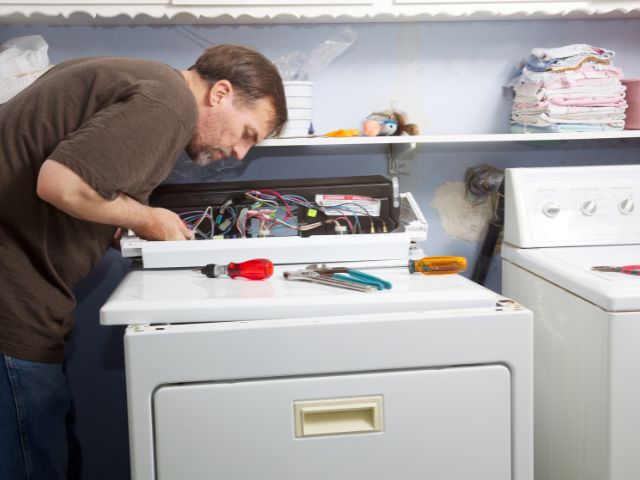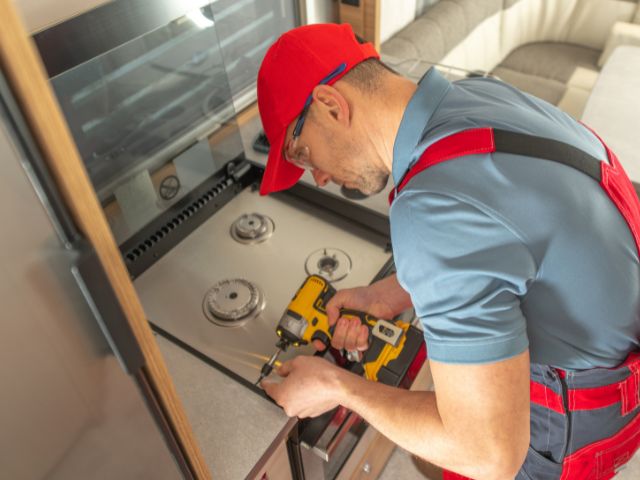Is your Viking dishwasher showing signs of age? If you’re dealing with recurring issues like inconsistent cleaning, leaks, or noisy operations, it’s natural to wonder whether you should repair or replace your old dishwasher. This guide will help you determine which option is the best for you. Whether you’ve been dealing with malfunctions or are simply curious about upgrading, understanding the factors involved will help you make the most cost-effective and efficient decision for your household.
Key Considerations: Should You Repair or Replace Your Old Dishwasher?
Dishwashers are vital kitchen appliances that simplify our lives by making cleanup a breeze. However, like all appliances, they wear out over time. Here’s how to decide whether to repair or replace your old dishwasher.
Age of the Dishwasher
One of the first things to consider is how old your dishwasher is. Most dishwashers have a lifespan of around 9 to 12 years. If your dishwasher is nearing or beyond this range, you might want to consider replacing it. An older appliance is more likely to have frequent breakdowns, leading to costly repairs. If your dishwasher is still relatively young and has only had minor issues, repairing it could be the more sensible choice.
Rule of Thumb: If the appliance is over ten years old, replacement is often the better option. However, if it’s less than five years old and the repair costs are minimal, repairing makes sense.
Cost of Repairs vs. Cost of Replacement
Another important factor is the cost. Repairs can often be cheaper than buying a brand-new appliance, but only up to a point. Industry experts suggest following the “50% rule”—if the repair cost exceeds 50% of the cost of a new dishwasher, replacing it is the better long-term investment.
For example, if a repair costs $300 and a new dishwasher costs $600, you’re probably better off replacing it. However, if a repair costs $150 and can extend the life of your dishwasher for a few more years, repair may be the way to go.
Energy Efficiency
Modern dishwashers are more energy-efficient than older models. Upgrading to a newer dishwasher can result in savings on your water and energy bills, thanks to advanced technology designed to use less water and electricity. Dishwashers built in the last five years often feature energy-saving cycles, more efficient spray arms, and sensors that adjust water usage based on the load.
Fun Fact: Energy-efficient dishwashers can use as little as three gallons of water per cycle, compared to older models that might use ten or more.
If your current dishwasher is significantly increasing your utility bills, it might be time to replace it with an eco-friendly model.
Frequency of Breakdowns
If your dishwasher is constantly breaking down, the hassle and cost of regular repairs can add up. Inconsistent cleaning, water not draining properly, or strange noises can be telltale signs that your dishwasher is on its last leg.
When breakdowns occur more frequently than once or twice a year, and the costs keep piling up, it’s probably time to cut your losses and invest in a new model.
Technology and Features
The technology in dishwashers has evolved drastically in the past decade. Newer models come with advanced features such as Wi-Fi connectivity, smart sensors, half-load cycles, and even self-cleaning filters. If your old dishwasher lacks features like adjustable racks, delayed start options, or child-lock safety, replacing it can give you more convenience and better performance.
If these features sound appealing and you can afford the upfront cost, replacing your old unit could enhance your kitchen experience.
Environmental Impact
Another consideration is the environmental footprint of your dishwasher. Older appliances often have a larger carbon footprint due to their inefficient energy and water usage. By replacing your old dishwasher with an ENERGY STAR-rated model, you’ll be reducing your environmental impact, saving on utility bills, and benefiting from the most up-to-date technology.
Repairing your existing appliance may reduce waste temporarily, but if it’s inefficient and needs frequent repairs, replacing it with a modern, energy-efficient model is the greener choice.
Availability of Parts
As dishwashers age, parts may become harder to find. If the necessary parts for your dishwasher are no longer in production, repairs could be expensive or even impossible. In such cases, replacing the dishwasher is often the only feasible option.
For newer dishwashers, parts are usually easier to find, and repairs are more straightforward and affordable.
When to Repair or Replace: The Bottom Line
Here’s a quick guide to help you decide:
- Repair if:
- The dishwasher is under five years old.
- Repair costs are less than 50% of the replacement cost.
- The appliance has only minor issues or breakdowns.
- You’re content with the current features and energy usage.
- Replace if:
- The dishwasher is over 10 years old.
- The repair costs are more than half of a new dishwasher’s price.
- It frequently breaks down or has major mechanical failures.
- You want a more energy-efficient and feature-rich model.
Final Thoughts
In the decision between to repair or replace your old dishwasher, the choice comes down to factors like the age of the appliance, cost of repairs, and energy efficiency. If your dishwasher is still relatively young and repairs are minor, fixing it could be the most economical solution. However, if it’s over a decade old, or repairs are becoming too frequent and costly, upgrading to a new, energy-efficient model might be the smarter investment.
Need expert advice or help with your dishwasher? Contact Viking Appliance Repair Pros for fast, reliable service. Our team is here to help you decide whether to repair or replace your old dishwasher and ensure your kitchen runs smoothly.
FAQs
1. How long should a dishwasher last?
A typical dishwasher can last anywhere from 9 to 12 years, depending on usage, maintenance, and the quality of the appliance.
2. What are the signs my dishwasher needs replacing?
Signs include frequent breakdowns, poor cleaning performance, increasing water or energy bills, and noisy operation.
3. Can I still use my dishwasher if it’s leaking?
Leaks should be addressed immediately as they can lead to water damage. A leaking dishwasher might indicate a need for repair, but if the issue persists, replacement may be necessary.
4. Are new dishwashers really more energy-efficient?
Yes, newer dishwashers with ENERGY STAR ratings can use significantly less water and energy, saving you money on your utility bills over time.
Explore our last blog post about the 10 Common Viking Dishwasher Error Codes for more information!






